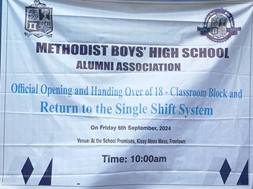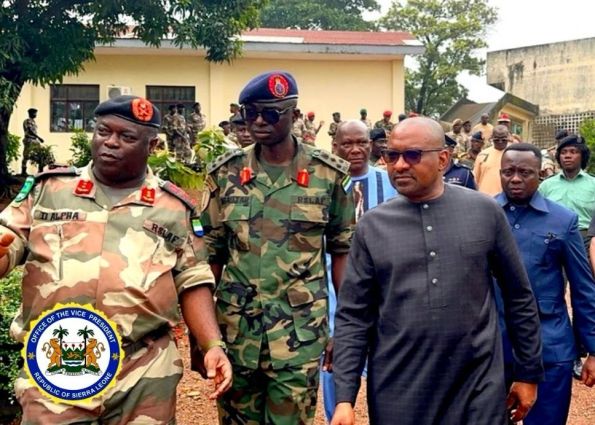By Amin Kef (Ranger)
Among the petroleum dealers in Sierra Leone, NP (SL) Ltd. stands tall as a highly commended and respected player, known for its reliability and prompt service delivery. With a steadfast commitment to ensuring the consistent availability of high-quality petroleum products, including petrol, diesel, kerosene, and others, NP (SL) has earned the trust and loyalty of consumers across the nation, preventing the dreaded fuel shortages that can disrupt daily life. This reliability has earned the company the distinction of being regarded as “First for Customer Care.”
A recent survey conducted by this medium sought to gauge the opinions of Sierra Leoneans from all walks of life regarding the performance of NP (SL) resulted in feedback that was overwhelmingly positive, with respondents hailing the company as one of the most successful 100% indigenously owned businesses in the country. NP (SL)’s ability to withstand the test of time has further solidified its reputation as a trusted leader in the petroleum industry.
Beyond its role as a fuel provider, NP (SL) has become a major player in addressing one of the country’s most pressing challenges: unemployment. While it is widely acknowledged that the Government must work to create employment opportunities for the nation’s youth, the private sector also has a crucial role to play. NP (SL) has embraced this responsibility wholeheartedly, providing jobs to Sierra Leoneans in various regions and categories.
The company’s positive impact on the workforce is widely acknowledged. Employees speak highly of the working conditions and many consider NP (SL) a vital contributor to poverty reduction. A seasoned Economist remarked, “It is rare to see a purely indigenous company like NP (SL), which is not only result-oriented but also fully staffed by Sierra Leoneans. This speaks volumes about the company’s commitment to national ownership and development.” He added that NP (SL) is a shining example of the Local Content Policy in action, a policy aimed at promoting national development by optimizing local talent and resources.
The commitment of NP (SL)’s Board and Management has empowered many Sierra Leoneans while positioning the company to expand further by opening more Filling Stations across the country. The company serves a diverse range of customers, ensuring that its petroleum products are available at competitive prices. This symbiotic relationship has fostered a win-win situation, with NP (SL) maintaining a strong rapport with its clientele, contributing to the company’s widespread appeal.
The Petroleum Regulatory Authority (PRA), which oversees petroleum companies in the country, has repeatedly lauded NP (SL) for its efficient service delivery.
It must be noted that the availability of fuel is often seen as a politically sensitive issue, as shortages can impact the Government’s popularity. NP (SL), however, has remained focused on its mission, prioritizing not just profit but also ensuring that petroleum products are timely available in order to enhance the well-being of the population.
A prime example of NP (SL)’s forward-thinking approach is its introduction of the NP Gas Cooker. Recognizing the health hazards and environmental damage caused by traditional cooking methods like using coal and wood, NP (SL) sought to provide Sierra Leoneans with a cleaner and safer alternative. The NP Gas Cooker is affordable, readily available at NP outlets, and offers a healthier cooking option, free from harmful carbon dioxide emissions.
In keeping with its commitment to innovation, NP (SL) has also embraced digital technology to improve customer experience. One such initiative is the introduction of Smart Cards, which allow customers to top up their accounts with any desired amount and use the card for fuel purchases at their convenience. This move has made transactions smoother and more efficient, earning the approval of many customers.
Recently, NP (SL) launched the pilot phase of its Energy Pass Card, a next-generation smart card designed to modernize the fueling process and promote a cashless environment. The Energy Pass Card offers several customer-friendly features, including real-time fuel balance updates, nationwide accessibility and offline functionality. Equipped with advanced security measures, the card ensures secure transactions and provides instant SMS notifications for every purchase. This innovative initiative aligns with NP (SL)’s broader strategy of leveraging digital technology to enhance operational efficiency, reduce human error, and improve transparency.
NP (SL)’s achievements extend beyond Sierra Leone’s borders. The company has expanded its operations to neighboring countries, including Liberia, Guinea, Ivory Coast and The Gambia. These branches are thriving, further enhancing NP (SL)’s reputation as a regional powerhouse in the petroleum sector.
As one of the largest taxpayers to the National Revenue Authority, NP (SL) plays a pivotal role in generating domestic revenue, which the Government can use to fund national development projects. Both past and present Governments have relied on NP (SL) as a significant contributor to the Consolidated Revenue Fund.
In a highly competitive industry, NP (SL) continues to stand out as a reliable, forward-thinking company that has earned the confidence of its customers. Its commitment to service excellence, innovation and national development has made it a source of pride for Sierra Leoneans across the country.















